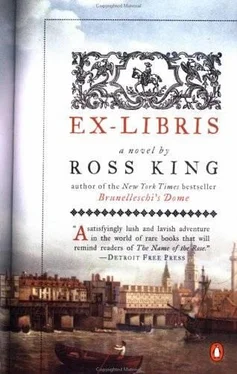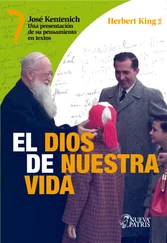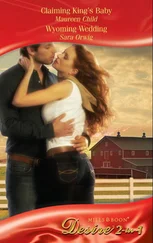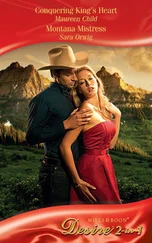I found something deeply appealing about this idea of a key that can be used to unlock the most complex secrets, this word or phrase that, almost like a divine fiat, turns the random and chaotic into an ordered pattern. Vigenère was not a magician after all. No-his system belonged to our new age, that of Kepler, Galileo and Francis Bacon, one in which outer husks were cast off and the kernel of truth exposed for all to see. His system confirmed my faith in the powers of human reason to penetrate the depths of any mystery. And so was it any wonder that I believed my scrap of paper, combined with a few secret syllables, might penetrate that of Sir Ambrose Plessington?
Except that I did not yet know the keyword. Feeling overwhelmed, I set the books aside as the watchman was calling ten o'clock. My cousin Erasmus still seemed my best policy. Over the years, I had sold him many books on the subject of decipherment and I had even heard a rumour that he had deciphered papers for Cromwell. So I decided that he, of all people, would know what to make of the scrambled letters. But I would tell him nothing of my suspicions that it was a cryptogram devised in order to conceal the location of Sir Ambrose's fortune. ' My dear Erasmus ,' I began, surprised by the slight tremor in my hand.
Darkness was complete by the time I finished the letter, and the bells of St. Magnus were announcing eleven o'clock. I would have to hurry, I realised, if I was to catch the night mail-coach. I reached for my coat, struck by a peculiar sense of urgency. But then I was struck, just as suddenly, by something else just as urgent.
There's nothing to fear, Mr. Inchbold. You will be quite safe. I promise…
As I shrugged into my coat and stared at the cipher on the bureau, the tiny crevice of doubt that had opened on the first night at Pontifex Hall now widened, and on a sudden impulse I knelt beside the bureau and prised up two loose floorboards, then tucked the slip of paper between the scantlings. After a moment's thought I added the inventory of missing books and the summons from Alethea, along with my down payment of twelve sovereigns-everything that could connect me with Pontifex Hall. Then I carefully replaced the boards, covered them with two stacks of books, and picked my way around other piles of books to the turnpike stair.
'Sir?'
I was halfway down the steps. Monk's face had appeared at the top, half hidden by his nightcap. He had given me a dreadful start.
'I shall be taking a turn in the street,' I called to him. Even in the gloom I could see his eyebrows rise in surprise. I rarely ventured outside after dark, and then usually only as far as the Jolly Waterman. If London was frightening by day, at night it was, from my limited experience, something else entirely. My resolve nearly deserted me. 'Only a short one,' I added. 'I have a letter to post.'
'Allow me, sir.' He started down the twisting steps. Posting letters was one of his many duties.
'No, no.' I shied a hand at him. 'All that sitting on the coach,' I explained, flexing my legs and patting my rump for his benefit. 'A walk will be just the thing for me. Now, please, Monk, to bed with you.'
The nightcap disappeared. A minute later I was stepping outside and on to the footway. The streets beyond the gate were empty and dark. The intermittent bull's-eye lanterns-a series of yellow haloes against the buildings-barely lit my way. From the distance came the sound of the bellman. I ducked my head and hurried after my shadow, moving as tentatively as if treading on eggshells.
The nearest receiving station to Nonsuch House was in Tower Street, near Botolph Lane. I found it without difficulty and, after dropping the letter through the posting-hole (a strong-box attached to the wall by means of a chain), I hurried back down Fish Street Hill to the sound of the curfew tolling. At its funereal call two sentries had stirred to life and were preparing to scrape shut the gates of the bridge. The portcullis had begun its descent. I scurried beneath in the nick of time, grateful once again to see the black-and-white hulk of Nonsuch House rising against the sky to meet me.
Thirty minutes later the letter was collected from the strong-box and delivered to the Inland Office, which occupied the upper floor of the General Letter Office in Clock Lane. There, by the light of a candle stub, among a litter of labels and hand stamps, the string was cut with a penknife, the wafer seal carefully broken, and the letter copied out word for word by a clerk. The clerk then carried the copy downstairs and into a larger room where a man sat behind a desk, thrumming the fingers of his right hand on its surface. His back was to the door.
'Sir Valentine,' murmured the clerk, whose name was Ottermole.
'What is it?'
'Another letter, sir. From Nonsuch House.'
The leather squeaked as Sir Valentine turned in his chair. The clerk placed the copy on the desk and, after climbing the stairs, folded the letter along its creases and carefully resealed it with a drop of wax. This, too, was delivered downstairs. A half-dozen brass-bound satchels sat by the doorway. By this time Sir Valentine had disappeared. Outside in the small coach-yard a team of horses was being hitched to the waiting mail-coach, due to arrive in Oxford some fifteen hours and five posts later.
Ottermole returned up the staircase to the Inland Office. A new pile of letters, folded and sealed, had been placed on the desk during his short absence. Sighing, he sat down before his candle stub and took up his penknife to cut the strings of another letter. As usual, it was going to be a long night.
From across the river, hemmed in by a November fog, Prague Castle looked poised and at peace. Snow had fallen heavily during the night. The fountains in the courtyards were still, their tumbling waters frozen solid, and the new snow stood inches deep on the arches and gateways. Beneath the ramparts the outlines of the gardens and their pollarded alleys could just be made out, their patterns broken by irregular clefts of shadow. The fire in the Spanish Rooms had died hours ago, for there was little left in the library to burn, but a ghost of black smoke hung motionless on the air. The entire castle seemed to have slipped into hushed suspension, as if holding its breath in wait. Then it came, the slow roll of gunfire, still far in the distance but drawing steadily closer. It could not be long now, a day at most, before the soldiers crossed the river and breached the gates of the Old Town. Then the Cossacks-the subject of so many frightened rumours-would make their appearance.
Standing on the balcony of the house in the Old Town Square, Emilia eased out a wisp of breath and listened to the clamour welling up from below. The exodus was about to proceed. Small armies of men were struggling to strap panniers to the pack-mules, or to lash sheets of canvas to top-heavy carts and wagons whose wheels had carved chaotic paths through the snow. The men had worked through the night. There were more than fifty vehicles in all, most already loaded and hitched to draught-horses and yellow oxen that were swaying their heads from side to side in sleepy feints. The procession twisted all the way round the square and then lost itself in the mist-skeined streets. Liveried pages were scampering back and forth through the snow, a few outriders cantered alongside the baggage-wagons, cursing in English and German. Across the square, beneath the dock-tower of the town hall, a draught-horse was being shod. The muffled ring of the hammer reached the balcony a split-second after each swing of the blacksmith's arm, making the entire spectacle look false and deranged, like a painting come imperfectly to life.
Gripping the frosted rail, Emilia leaned into the cool air, peering westward across the snow-capped chimneys and wattled rooftops to where the White Mountain, five miles distant, stood lost in its pall of grey mist. The Summer Palace had been taken during the night. Soldiers and courtiers alike had been slain. Her gaze drifted back down the slope of the hill to the Vltava, a rusty blade flashing in odd glimpses between the gaps in the straw-and-plaster houses. She caught sight of a grisly ballet of bodies twisting downstream on the current, arms spread wide and coat-tails fanned like the wings of angels. The Moravian foot-soldiers. Last night they had tried, and failed, to swim across the river to the safety of the Old Town.
Читать дальше












